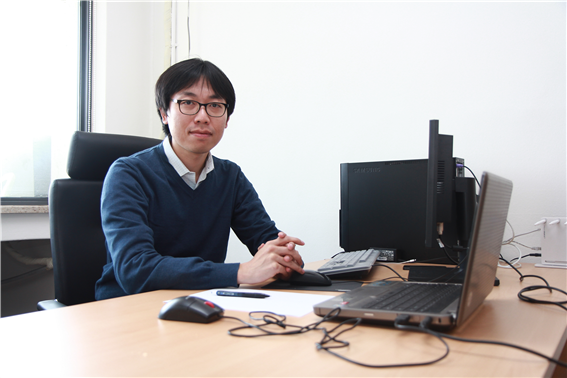- Ajou GSIS
- Academics
- Admissions
-
Student Life
Student Life
- Alumni
-
Notice
Notice
Notice
Ajou Univ. News
NEW (2015-04-24) Ajou’s Professor Sung Hwan Kim develops a human-body-friendly bio sensor by using silk
- 2015-04-29
- 21690

A team led by Professor Sung Hwan Kim (pictured above. Department of Physics and the Graduate School’s Department of Energy System Research) from Ajou University succeeded in developing a human-body-friendly bio sensor by using silk obtained from silkworms.
The achievement of Professor Sung Hwan Kim’s team was published on April 1st in the online issue of Nano Letters, a renowned international academic journal in the field of nano studies. The paper is entitled “A Highly Tunable and Fully Biocompatible Silk Nanoplasmonic Optical Biosensor.” Myeong Jae Lee (doctoral course, first author) and Professor Heon Su Jeon (co-author) from the Department of Physics and Astronomy of Seoul National University also took part in the research.
The nano bio sensor developed by Professor Kim’s team is compatible with the human body because it uses silk obtained from silkworms, and it also has a high detection rate. Therefore, the sensor is expected to be widely used for smart healthcare, which is emerging as a next-generation growth engine for IT companies.
The team extracted liquid-state silk protein from silk worms and created nano optical elements with a gold nano structure on silk films by utilizing semi-conductor processing technology. Bio sensors made through this process showed detection sensitivity rates 5-6 times higher than those of existing ones.
Professor Kim explained, “By inserting very thin silk films inside a gold nano structure, the volume of the films expands as they respond to water or chemical substances such as alcohol,” adding, “You can achieve high detection sensitivity as the light wavelength to which nano optical elements respond extends with the films’ expansion.”
Professor Kim went on to say, “The research is significant in that it has opened the possibility for silk protein, which has only been considered a fiber to this point, to be recreated as a human-body-friendly bio sensor,” adding, “I expect the research to provide insight for future studies regarding the healthcare market.”
The study was conducted with the support for basic research projects (for new researchers and leading research centers) carried out by the Ministry of Science, ICT and Future Planning and the National Research Foundation of Korea.
 아주대학교 국제대학원
아주대학교 국제대학원